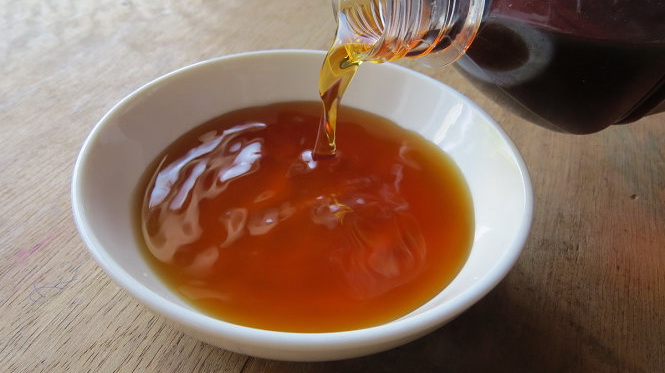The salty, flavorful sauce made from fermented fish that is popular across Southeast Asian countries, most notably Vietnam, may trace its origin to an ancient Roman colony in Africa.
If you live in Vietnam or have tried some Vietnamese dishes, chances are you have tasted, maybe without even knowing it, a fair amount of nuoc mam, or Vietnamese fish sauce -- the ‘secret ingredient’ that gives local dishes the taste and smell that mesmerize diners.
Nuoc mam is made by putting interleaving layers of fish and sea salt inside an anaerobic container, usually made from wood or ceramic.
The resulting amber-color liquid extracted from the mix after a fermentation period of between six and twelve months is high in protein, salty in flavor, and strong to the nose.
Nuoc mam is used as a condiment for a variety of Vietnamese dishes, from the southern feast of ca kho to (clay pot-braised catfish), which wowed judges at competitive cooking show US MasterChef with a portion prepared by third-season winner Christine Ha, to the northern delicacy of bun cha (rice noodles with grilled pork and meatballs) that U.S. President Barack Obama could not resist a try during his formal visit to Vietnam in May.

A southern Vietnamese dish served with a small bowl of sour-spicy fish sauce dip. Photo: Tuoi Tre
European origins
Though experts still debate the origin of fish sauce, many believe it traces its origin to the ancient Carthaginian civilization, which is now a part of the African country of Tunisia, Pha Le, a Vietnamese culinary expert, wrote in a recent piece to the Tuoi Tre Cuoi Tuan (Weekend) weekly magazine.
According to Pha Le, the oldest available records of a sauce made from fermented fish are found in the writings of Mago, a Carthaginian agricultural writer who lived in the sixth or fifth century BCE.
In 146 BCE, Carthage was conquered by the Roman Empire and the fish fermentation techniques of the Carthaginian people were taken and spread across Europe, giving rise to the establishment of several fish sauce producing facilities in the continent.
The sauce’s popularity across the Roman Empire at the time was comparable to wine, with prices varying greatly depending on the quality of the fish used in the making. A good bottle of fish sauce could cost up to US$500 of today.
Ancient Romans used fish sauce in many of their cuisines, both as a substitute to salt as the base for dips, sauces, and salad dressings.
Archaeologists believe the Roman version of fish sauce was spread into Asia through trades on the Silk Road, and Asians began producing their own fish sauce somewhere around the beginning of the Middle Ages, coinciding with the fall of the Roman Empire that cut off Asia’s supply of the sauce.
For nearly a millennium after the fifth century AC, fish sauce was the dominant condiment across Asian countries, until the Chinese people invented soya sauce, which is made from the fermentation of soya beans, during the 14th century.
The introduction of soya sauce pushed fish sauce out of the kitchen in China and Japan, whose people found the flavor of soya sauce go better with their local dishes.
As of today, fish sauce is most popularly used in cooking and accompanying meals in the Southeast Asian countries of Vietnam and Thailand, where ample sunshine and long coastlines allow year-round fishing and production of sea salt.

A ‘nuoc mam’ producing facility in southern Vietnam’s Phan Thiet Province where fish and salt are fermented in large wooden barrels. Photo: Tuoi Tre
Like us on Facebook or follow us on Twitter to get the latest news about Vietnam!





















































